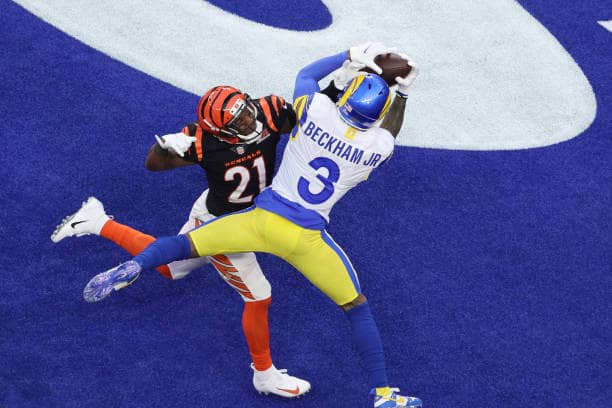We’ve seen a lot of things over the past 20 years of Super Bowls, including terrific games, blowouts and everything in between. It’s the biggest sporting event – and sports betting event – of the year, and nothing comes close.
One of the most fun prop markets to wager on is the first touchdown scorer, and we’ve done the research to help you for this year’s Big Game.
Over the past 20 Super Bowls, 108 touchdowns have been scored – an average of 5.4 per game. The fewest TDs scored in a game in that period was one, in Super Bowl LIII – a 13-3 New England Patriots win over the Los Angeles Rams. The most TDs scored in a game was eight, in Super Bowl LII – a 41-33 Philadelphia Eagles win over those same Patriots.
In this article, we break down the frequency of touchdowns scored by position.
Wide Receiver (45)
It’s no surprise that the greatest number of touchdowns from one position over the past 20 Super Bowls comes from the wide receiver position, as the league has shifted to more of a pass-heavy approach.
Greg Jennings (Super Bowl XLV), Larry Fitzgerald (Super Bowl XLIII), Jacoby Jones (Super Bowl XLVII), Cooper Kupp (Super Bowl LVI) and Tee Higgins (Super Bowl LVI) are the only WRs with two touchdowns in a single game during the last 20 years.
No wideout has had three TDs in a Super Bowl during that span, and Jerry Rice is the only WR to ever score three TDs in the Big Game (twice).
The longest touchdown also came from a wide receiver when Baltimore Ravens WR Jacoby Jones returned the second-half kickoff of Super Bowl XLVII 108 yards against the San Francisco 49ers.
Eight wide receivers have scored the first touchdown of a Super Bowl in the last 20 years, the highest mark of any position. Typically, the No. 1 wideout on a team has close to the shortest odds for first TD scorer.
Running Back (30)
Running backs have the second-most touchdowns in Super Bowls over the past 20 years, mostly from short distances.
The two longest TD runs were 27 yards (Leonard Fournette in Super Bowl LV) and 33 yards (DeShaun Foster in Super Bowl XXXVIII). Otherwise, the majority are short runs.
There have been seven receiving TDs from running backs, the longest being Corey Clement’s 22-yard TD catch in Super Bowl LII.
The longest TD run in the past 20 Super Bowls was Willie Parker’s 75-yard scamper in Super Bowl XL.
Running backs have had just six first TDs over the past 20 Super Bowls. With the prevalence of quarterback sneaks (especially in the past few seasons), QBs have been taking scores otherwise reserved for running backs. Still, running backs usually have the shortest odds in first TD markets.
Tight End (16)
This could be renamed the Rob Gronkowski section, as Gronk is responsible for five of the 18 touchdowns from tight ends. Most of these are short receptions, with Gronk’s 22-yard TD catch in Super Bowl XLIX the longest of the bunch.
Travis Kelce is the only other TE with multiple Super Bowl touchdowns, scoring one in Super Bowl LIV and one in Super Bowl LVII. Eight of the 18 TDs are from inside the 5-yard line.
Tight ends have produced only two of the past 20 first touchdowns in Super Bowls. Kelce is among the favorites to score first in this year’s Super Bowl, but that’s an exception to the rule.
Quarterback (7)
There have been six rushing touchdowns by quarterbacks in the past 20 Super Bowls, including three just last year by Jalen Hurts – all from within the 4-yard line. Patrick Mahomes also had one in the Super Bowl LIV.
The only QB reception came in Super Bowl LIV when Nick Foles caught a 1-yard TD reception as part of the famous “Philly Special” play.
Quarterbacks have produced three first TDs in the past 20 Super Bowls, including Hurts in last year’s Super Bowl. Quarterbacks are typically lower down the odds board for first TDs unless the QB is a terrific runner like Lamar Jackson or Hurts.
Linebacker (4)
This might seem like a high number of touchdowns from the linebacker position, but it’s accurate.
The Chiefs’ Nick Bolton recovered a Hurts fumble in Super Bowl LVII for a game-changing touchdown, and we all remember James Harrison’s 100-yard INT return for a TD in Super Bowl XLIII right before halftime.
Defensive Back (4)
There have been three pick-sixes from cornerbacks and one from a safety (Nick Collins) in the past 20 Super Bowls.
Perhaps the most famous was New Orleans Saints CB Tracy Porter’s 74-yard INT return for a TD with 3:24 left in Super Bowl XLIV vs. the Indianapolis Colts, which essentially won the game.
Robert Alford had an 82-yard INT return for a TD with the Atlanta Falcons in Super Bowl LI against the Patriots, which put the Falcons up 21-3. We all know how that one ended, though.
Fullback (1)
We have to give fullbacks some love since they have one of the more thankless jobs in the NFL. But 49ers fullback Kyle Juszczyk does it all, and he had a 15-yard TD reception from Jimmy Garoppolo in the second quarter of Super Bowl LIV to help San Francisco tie the game 10-10 against Kansas City.
The Niners held a 20-10 lead going into the fourth quarter but ended up losing 31-20.
Defensive Lineman (1)
There has only been one TD from a defensive lineman. It was from the Denver Broncos’ Malik Jackson, who recovered a Cam Newton fumble in the end zone in Super Bowl 50 that was forced by a Von Miller sack.That play helped spur the Broncos to a 24-10 victory.
Jackson’s TD was also the first TD in Super Bowl 50, but it’s the only time a defensive lineman has scored. Defensive players are usually listed together as a unit on sportsbooks rather than individually.
Photo by Gregory Shamus/Getty Images



